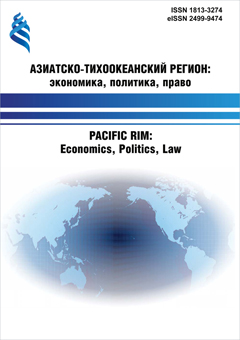THE CONCEPT OF "TOLERANCE" IN UN DOCUMENTS: LINGUISTIC AND LEGAL ARGUMENTS TO SUPPORT MODIFICATINOS
Original article
DOI:
https://doi.org/10.24866/1813-3274/2021-4/132-144Keywords:
tolerance, basic meaning, optimal principle of relationships, immanent features, declaration of principles of tolerance, la tolérance, terpimost', tolerantnost', UNESCO declaration, harmony in diversity, otherness, UN working languages, Russian version, reasons for inconsistency, long-years patterns, religious superiority, Resolution 36/55, Resolution 48/126, Resolution 69/312, Resolution 73/128, Resolution 75/237.Abstract
The need to study this problem is associated with individual contradictions in the United Nations (UN) documents and the need to eliminate them. The purpose of the article is to substantiate the advisability of making changes to UN documents due to the incorrect use of the concept of "tolerance" and its analogues, including in Russian versions. In the main part of the study, the authors, on the basis of their comparative analysis of the content of the UN General Assembly Resolutions, in terms of the use of the concept of "tolerance", come to the discovery of two groups of contradictions in UN documents that require resolution. The authors examine these two groups of contradictions in detail, noting their characteristic features. Universal human rights take priority over the rights of people determined by their racial, religious, ethnic affiliation, as well as other immanent features. The social contradictions that have worsened against the background of the COVID-19 pandemic have led to a number of conflicts based on hostility towards carriers of "otherness". The events of 2020 have shown that it is imperative to introduce "harmony in diversity" into the relationships between people with different immanent features. The international political and legal institute, designated in the working languages of the United Nations by the terms "tolerance" and "la tolerance", is designed to provide this harmony. Meanwhile, at present there are many circumstances that prevent the implementation of the idea of "tolerance" ("la tolérance"). The most important of them is the lack of a clear position in official UN documents regarding the content of the idea. The analysis of UN documents, including the Russian-language versions, revealed contradictions in the use of the concept of "tolerance" ("la tolérance") and its analogues. Thus, the concept of "tolerance" ("la tolerance") is still used in UN documents in the meaning contained in the UN Charter. Meanwhile, in 1995, UNESCO, on behalf of the UN, adopted the Declaration of Principles of "tolerance" ("la tolérance"), in which the principle of "tolerance" ("la tolérance") is disclosed in detail as an optimal principle of relationships between people with different immanent features. The UN ignores the content of the Declaration in its documents. Thus, the UN not only does not use the potential of the idea of "tolerance" ("la tolerance"), but also gives a serious reason to the opponents of the idea to talk about its uselessness. In addition, in the UN documents in Russian as an analogue of "tolerance" ("la tolérance") the mutually exclusive concepts of "tolerantnost'" i "terpimost'" are used. The purpose of the article is to give reasons for the need to eliminate the above contradictions in UN documents. The article proves that the effectiveness of promoting the idea of tolerance will continue to decline without the required changes to UN documents. It proposes measures to introduce changes related to the concept of "tolerance," both in UN documents and in their Russian-language versions. The main conclusion made by the authors is that without making changes to the UN documents, the effectiveness of promoting the idea of "tolerance" will continue to decline further.
Downloads
References
Альянс цивилизаций Организации Объединенных Наций. Резолюция ГА ООН. 06 июля 2015 г. № 69/312. – URL: https://undocs.org/ru/A/RES/69/312 (дата обращения: 08.08.2021).
Глобальный призыв к конкретным мерам, направленным на ликвидацию расизма, расовой дискриминации, ксенофобии и связанной с ними нетерпимости и всеобъемлющее осуществление и принятие последующих мер по выполнению Дурбанской декларации и Программы действий. Резолюция ГА ООН. 31 декабря 2020 г. № 75/237. – URL: https://undocs.org/ru/A/RES/75/237 (дата обращения: 08.08.2021).
Год ООН, посвященный терпимости. Резолюция Генеральной Ассамблеи ООН. 14 февраля 1994. № 48/126. – URL: https://undocs.org/ru/A/RES/48/126 (дата обращения: 08.08.2021).
Декларация о ликвидации всех форм нетерпимости и дискриминации на основе религии или убеждений: Резолюция 36/55 ГА от 25 ноября 1981 г. – URL: https://undocs.org/ru/A/RES/36/55 (дата обращения: 08.08.2021).
Декларация принципов терпимости. Резолюция 5.61 Генеральной конференции ЮНЕСКО. 16 ноября 1995 г. – URL: https://www.un.org/ru/docu ments/decl_conv/declarations/toleranc.shtml (дата обращения: 08.08.2021).
Кириллов, Д. А. О рассогласованности в регулировании религиозной толерантности Конституцией России и национальным законодательством о свободе совести / Д. А. Кириллов, Е. Г. Сеченова // Вестник ТюмГУ. Социально-экономические и правовые исследования. – 2019. – № 1. – С. 74–91.
Правила о языках. Резолюция Генеральной Ассамблеи ООН. 01 февраля 1946 г. № 1/2. – URL: https://undocs.org/ru/A/RES/2%28I%29 (дата обращения: 08.08.2021).
Просвещение и религиозная толерантность. Резолюция Генеральной Ассамблеи ООН. 12 декабря 2018 г. № 73/128. – URL: https://undocs. org/ru/A/RES/73/128 (дата обращения: 08.08.2021).
Рылова, А. Термин «толерантность» / «терпимость». Досье // ТАСС. 16.11.2015. – URL: https://tass.ru/info/2441674 (дата обращения: 08.08.2021).
Симаворян, А. Религиозная толерантность в современном обществе / А. Симаворян, В. Овян // 21-й ВЕК. – 2013. – № 1 (26). – С. 82–90.
Стернин, И. А. Толерантность и терпимость. 18.10.2014. – URL: http://sterninia.ru/index.php/izbrannye-publikatsii/item/188-tolerantnost-i-terpimost (дата обращения: 08.08.2021).
Устав ООН. – URL: https://www.un.org/en/sections/un-charter/preamble/in dex.html (дата обращения: 08.08.2021).
Яркова, Е. Н. Миграция: типология этнокультурной политики // Вестник Тюменского государственного университета. Социально-экономические и правовые исследования. – 2017. – № 2. – С. 25–35.



